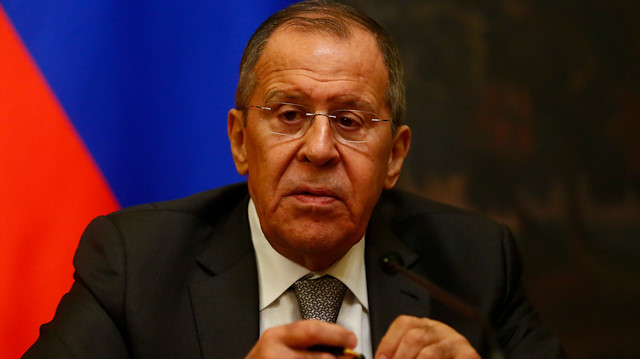
If still some 'tiny areas' left with YPG/PKK terrorists, work to be accomplished till end: Russian foreign minister
Russian Foreign Minister Sergey Lavrov vowed on Wednesday to complete the obligations, undertaken by Moscow under the Russian-Turkish memorandum on Syria.
Speaking at a news conference in Moscow, following the meeting with his Bahraini counterpart Khalid bin Ahmed al Khalifa, Lavrov commented on statements by the Turkish top officials on Russia's failure to comply with the deal, sealed by the presidents of the two countries in Sochi on Oct. 22.
Withdrawal of the YPG/PKK terrorists is almost complete, and if there are still some "tiny areas" left, Russia will accomplish its work "till the end," he said.
Alexey Yerkhov, Russian ambassador in Ankara, had contact with the Turkish government, during which Russian diplomat was reassured that it was "a misunderstanding," he added.
"Yesterday, after the Defense Ministry made this statement in response to Ankara's allegations of non-compliance with the Sochi agreements, there was a contact between representatives of the Turkish government and our ambassador, during which our ambassador was assured that it was a misunderstanding, that no one in Ankara questioned the work that Russia has done. Neither [Turkish Foreign Minister] Mr. Cavusoglu, my colleague and friend, nor [Turkish Presidential Spokesman] Mr. Kalin spoke about any resumption of Operation Peace Spring. That, in general, it was, as I said, a misunderstanding," Lavrov said.
On Monday, Cavusoglu said the U.S. and Russia have not yet fulfilled the agreements signed with Ankara on northern Syria. He also added that Turkey would do everything necessary to achieve the results in preventing a terrorist threat. The position was supported by Kalin, who called on Moscow and Washington to accomplish the agreements with Turkey on Syria.
Lavrov confirmed Moscow had noticed that after the U.S. announcement to stay in Syria to defend the oil fields, the SDF -- another name used by the terrorist YPG/PKK -- leadership returned to their separatist pursuits, counting on Washington's help.
"Apparently, someone in the leadership of the SDF decided to stake on the fact that the Americans will constantly support them. It would be a wrong choice. I believe that in the interests of the Kurds, in the interests of ensuring the rights of the Kurds, there is no alternative but to take a course of dialogue with the legitimate authorities of the Syrian Arab Republic," the minister said, adding that this could also contribute to ease Ankara's concerns over the security on the Turkish-Syrian border.
The YPG, the PKK's Syrian offshoot, is the main force that constitutes the SDF. U.S. reliance on the YPG and SDF in the anti-Daesh/ISIS fight has angered Ankara and strained relations.
- Bahrain slams US decision on Israeli settlements
Khalid bin Ahmed al Khalifa, in his turn, slammed the U.S. decision to stop considering Israeli settlements on the Palestinian territory illegal.
"These are illegal activities, illegal settlements that are established on the occupied Palestinian land, it cannot be recognized as legitimate, it is from this position that it is necessary to approach this issue, as for the settlement of the Palestinian-Israeli conflict, it should be based on the international legal framework," Khalifa said.
The U.S. on Monday reversed course on its position regarding Israeli settlements built in the occupied West Bank, breaking with over four decades of precedent in saying that they will no longer be viewed as illegal "per se".
The move is highly likely to irk Palestinian officials, who have rejected a role for the U.S. in any prospective peace talks with Israel over the Trump administration's 2017 decision to unilaterally recognize Jerusalem as Israel's capital.
The U.S. under President Donald Trump has since gone on to close the Palestinians' diplomatic office in Washington and has relocated its embassy in Israel from Tel Aviv to Jerusalem.
Roughly 650,000 Israeli Jews currently live on more than 100 settlements built since 1967, when Israel occupied the West Bank and East Jerusalem.
The Palestinians want these territories along with the Gaza Strip for the establishment of a future Palestinian state.
International law views both the West Bank and East Jerusalem as occupied territories and considers all Jewish settlement-building activity there illegal.


